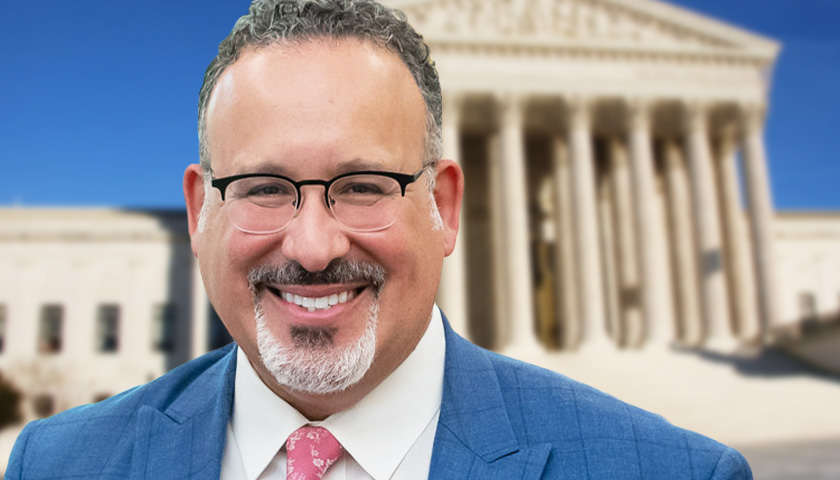Secretary of the U.S. Education Department Miguel Cardona reacted to the Supreme Court’s decision to strike down the use of race in weighing college admissions with the claim the ruling “takes our country decades backward” because such discrimination based on the color of skin has served as “a vital tool that colleges have used to create vibrant, diverse campus communities.”
Cardona said in a press statement the Court’s 6-3 ruling Thursday in Students for Fair Admissions, Inc. v. President and Fellows of Harvard College is “yet another blow to the fight for equal opportunity”:
As we consider today’s decision, our commitment to educational opportunity for all Americans is unshaken, and our efforts to promote diversity in higher education are undeterred. The Department of Education is a civil rights agency, committed to equal access and educational opportunity for all students.
Cardona appeared to assume the Court’s finding that considering a person’s skin color in college admissions is unconstitutional is offensive and discouraging to all non-white students:
I want to send a message to all aspiring students, especially Black, Latino, Asian American, Native American, Alaska Native, Native Hawaiian, Pacific Islander, and other students from underserved communities: we see you and we need you. Do not let this ruling deter you from pursuing your educational potential. Our colleges and our country itself cannot thrive and compete in the 21st century without your talent, ingenuity, perseverance, and ambition.
The education secretary implored the nation’s higher education leaders not to “lessen your commitment to campus communities that reflect the rich diversity of this nation, which enhance the college experience in myriad ways and prepare students from all walks of life to live, work, and lead our democracy together.”
“The Biden-Harris Administration is committed to supporting you in pursuing all lawful practices that meet that goal,” Cardona said. “We will continue working with you to raise the bar for inclusivity and work intentionally to better support students of color, because the inequities that exist in higher education access and outcomes remain unacceptable.”
Nevertheless, former Minnesota gubernatorial candidate Kendall Qualls, the president of TakeCharge, a black-led organization that counters the ideology that America is inherently racist against black Americans, welcomed the Court’s ruling.
“A race-based worldview robs people of merit-based pride of achievement & more importantly their dignity and American identity,” Qualls posted to Facebook.
“The Affirmative Action decision by the Supreme Court is long overdue,” he said, especially noting his agreement with the statement of Justice Clarence Thomas:
Individuals are the sum of their unique experiences, challenges, and accomplishments. What matters is not the barriers they face, but how they choose to confront them. And their race is not to blame for everything – good or bad – that happens in their lives.
“We must stop training generations of young black students in the art of perpetual victimhood over the core principles of America: hard work, education, faith & family values,” Qualls asserted. “In order to realize the dream of American opportunity, it is critical that black Americans restore the importance of two-parent families and reverse the trend of children born in 80 percent fatherless homes with a return to the basics of faith, family and education.”
“For too long,” Chief Justice John Roberts wrote for the majority, universities “have concluded, wrongly, that the touchstone of an individual’s identity is not challenges bested, skills built, or lessons learned but the color of their skin. Our constitutional history does not tolerate that choice.”
Joined by Justices Clarence Thomas, Samuel Alito, Neil Gorsuch, Brett Kavanaugh and Amy Coney Barrett, Roberts made clear the use of affirmative action to boost diversity on campus is discriminatory.
“Eliminating racial discrimination means eliminating all of it,” the chief justice said.
“The student must be treated based on his or her experiences as an individual—not on the basis of race. Many universities have for too long done just the opposite,” he wrote.
In a separate “fact sheet,” the education department observed that Biden is now “calling on colleges and universities, when selecting among qualified applicants, to give serious consideration to the adversities students have overcome, including:
- the financial means of a student or their family;
- where a student grew up and went to high school; and
- personal experiences of hardship or discrimination, including racial discrimination, that a student may have faced.
Among the actions announced by the Biden administration in reaction to the Court’s ruling is a “report on strategies for increasing diversity and educational opportunity, including meaningful consideration of adversity.”
– – –
Susan Berry, PhD is national education editor at The Star News Network. Email tips to [email protected]
Photo “Miguel Cardona” by The White House. Background Photo “U.S. Supreme Court” by Jarek Tuszyński. CC BY-SA 3.0.





